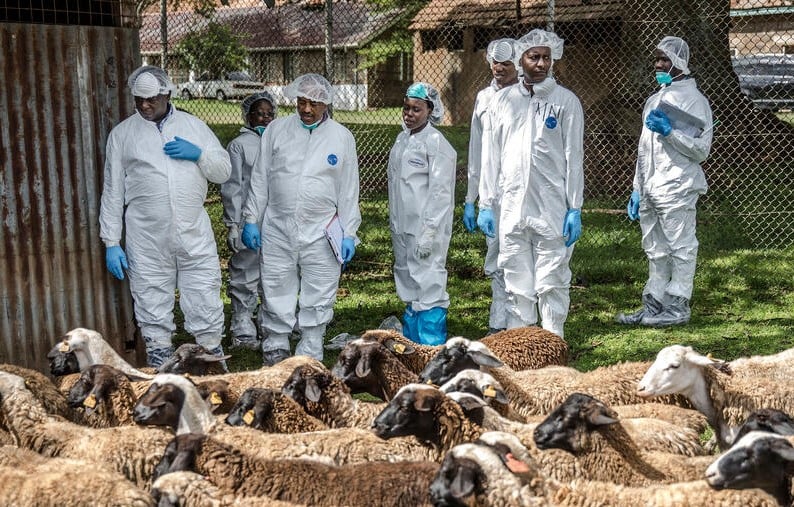December 8, 2025 | 09:20 GMT +7
December 8, 2025 | 09:20 GMT +7
Hotline: 0913.378.918
December 8, 2025 | 09:20 GMT +7
Hotline: 0913.378.918

A FAO training course for veterinarians in Kenya.
A new study led by the Food and Agriculture Organization of the United Nations (FAO) and research partners highlights that improving livestock productivity is key to achieving substantial reductions in global antibiotic use.
Without targeted interventions, antibiotic use in livestock is projected to rise nearly 30% by 2040. However, the new research, published in Nature Communications, finds that strategic productivity gains in livestock systems could cut projected antibiotic use by half.
The study projects that, under a business-as-usual scenario, global livestock antibiotic use could rise to 143,481 tons by 2040, an overall increase of 30% from 2019. However, alternative scenarios indicate that antibiotic use could be reduced by up to 57% if livestock productivity is optimized.
By improving animal health, management practices, and production efficiency, antibiotic use could be lowered to approximately 62,000 tons by 2040, demonstrating the potential of targeted interventions in achieving global reduction goals."
Enhancing livestock production efficiency is key to curbing antibiotic use," said Alejandro Acosta, Livestock Economist at FAO and lead author of the study. "By producing more animal-sourced food with the same or fewer animals, we can reduce the need for antibiotics on farmed animals while strengthening global food security."
This message underscores global commitments to combat Antimicrobial Resistance (AMR). The 2024 UN General Assembly AMR Declaration calls for a significant reduction in antimicrobial use in agrifood systems by 2030. Achieving this goal poses considerable challenges, especially in regions where livestock production is expanding to meet growing food demand."
Stakeholders across the livestock sector must work together to improve disease prevention, strengthen monitoring systems, and invest in innovations that enhance animal health while reducing reliance on antibiotics" emphasized Junxia Song, Senior Animal Health Officer at FAO and co-author of the study.
In support of these efforts, FAO recently launched the “Reduce the Need for Antimicrobials on Farms for Sustainable Agrifood Systems Transformation” (RENOFARM) initiative. This program provides policy guidance, technical assistance, and capacity-building to help countries curtail antibiotic use while promoting sustainable livestock transformation.
“FAO is committed to transforming agrifood systems by reducing the need for antimicrobials, as the RENOFARM does, thereby promoting sustainable practices and safeguarding public health,” said Thanawat Tiensin, Assistant Director-General and Director of FAO’s Animal Production and Health Division.
A key contribution of the study is the introduction of the Livestock Biomass Conversion (LBC) method, which improves accuracy in estimating livestock biomass across different species, production systems, and management practices. This allows for a more precise estimation of antibiotic use intensity, enabling policymakers and stakeholders to develop more effective strategies to optimize livestock production and minimize reliance on antibiotics.
The study, "The Future of Antibiotic Use in Livestock," was conducted by FAO experts Alejandro Acosta, Wondmagegn Tirkaso, Francesco Nicolli, Giuseppina Cinardi, Junxia Song in collaboration with Thomas Van Boeckel from the University of Zürich.
(FAO)
/2025/12/03/5125-2-204704_295.jpg)
(VAN) As the province with the largest forest area nationwide, Nghe An is standing before a special opportunity to develop the forest carbon credit market.
/2025/12/02/2629-3-141849_60.jpg)
(VAN) Based on its large-scale planted forests, several rubber enterprises have proactively conducted greenhouse gas emission inventories in preparation for entering the forest carbon credit market.

(VAN) MAE is leading in developing a national rare earth strategy, which will be submitted to the competent authorities for promulgation in early 2026.
/2025/12/02/4006-4-092040_652.jpg)
(VAN) The model of converting low-efficiency rice land to aquaculture in many localities has helped increase incomes by 5 to 15 times, improve the environment, and form new fisheries economic zones.

(VAN) Funded by ACIAR, Project FST/2020/123 focuses on measures to prevent harmful alien species, thereby protecting forests from invasive threats.

(VAN) The National Assembly's Supervisory Delegation pointed out solutions for the blue economy, circular economy, environmental protection, and technology application for sustainable marine governance.

(VAN) Lao Cai’s forestry sector is stepping into the spotlight with a series of pioneering initiatives in forest management, monitoring, and sustainable development aimed at generating carbon credits.